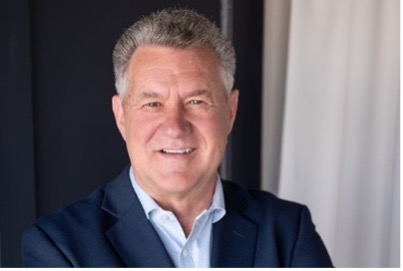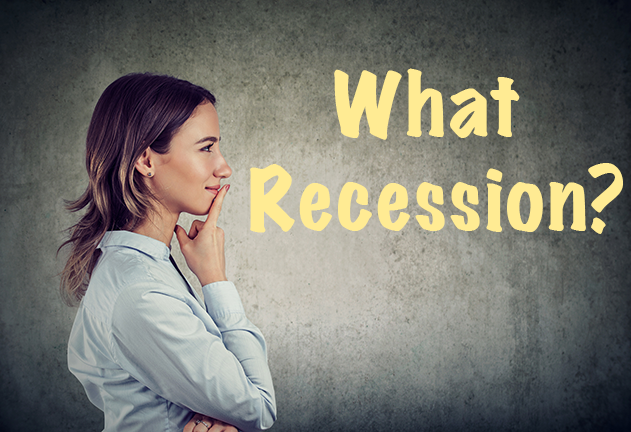What Recession?
by Sid Raisch
“It’s the ECONOMY!”
Once in a while there’s a phrase that’s quoted and wins an election as this one did. Similarly we are running for election by our customers and other constituents (all the people in our audience) to support if not come into our store every day they go to a store, or could (including online store).
Let’s not get so distracted by the price of gas, inflation, stock market, interest rates and other things in the news that we forget to pay attention to the actions we need to be taking so as to not create our own self-fulfilling economic collapse.
More than the economy, It’s the MARKETING!
While I’m not known as The Group’s marketing “guru” everything I do for clients contributes to marketing. That guru spot was already taken and we do have other marketing resources, BUT marketing is something I concentrate on because I believe everything to do with a business is a marketing effort. More than being one of the tools on my “Swiss Army Knife of Consulting” all of the others enable marketing to be more effective.
Marketing determines our economy. It has been said that we’re not in the business we think we’re in, we’re in the business of MARKETING the business we thought we were in. What I’m talking about specifically is integrating marketing throughout everything (because it already is anyway), but doing so with specific intent at a higher level than we’ve ever thought about it, so it matters enough to make a BIG difference.
It’s not what we think about marketing, it’s how we think about marketing that matters most. Many people have misdirected thinking about marketing. Too many people think marketing is a choice between media, or a mix of (formerly mainstream) media like television, radio, newspaper, direct mail, and now social media, search, curb appeal, and promotional vehicles, among others. Those choices do need to be made, but let’s begin at the beginning – what is the message? Your story is a message, and once your audience knows it they will grow tired of that if you don’t extend it with timely and relevant information that causes them to want to buy something along the way. Otherwise, you’ll eventually pass the point of economic irrelevance (aka liquidation). Beyond our story, which is an important connecting point, what is our message? Will our constituents hear it, believe it, and respond because of it? I’m going to pause on this line of thinking for the moment because it’s what my paying clients pay for. But I do have some more free information to think about, and that’s in the form of how to think about the economy and the marketing opportunities it presents.
Our marketing is our economy.
The only economy that matters is our own economy, while the only economies we hear about in the media are the national or global economy, of which we can do nothing but react. With OUR economy - we get to create it to our own liking, within the conditions we create and live within.
Our economy is exactly like our chart of accounts in one important way – it begins with revenue. The amount of money that doesn’t show up as revenue just doesn’t exist. It won’t help pay the wages or operating expenses, and while there may not be cost of goods for a “no-sale” those expenses will still be there.
If we stop selling things that sell but don’t generate profit we gain on every sale, (without taking away from another one). This is in contradiction with what you may have learned about incremental gains because that concept doesn’t take into account the cost of losing focus to the distraction.
Why do so many people continue to sell things they know for sure are not making a positive net contribution? Why do so many put so much effort toward buying, handling, and selling items that are proven and known to contribute negatively to GMROII. What a mess those things create. What if ALL efforts went into ONLY the products that deliver GMROII above $2.00?
THINK differently about currency.
- Perceived Value is Currency – Money has a wide range of value because all value is perceived. Pricing is still our most critical economic decision after deciding what merchandise we will be putting prices on.
- Credibility is Currency – Who are we to our constituency? We are who we are, which is a reflection of what we stand for, and against as stated by the merchandise we sell and the way we sell it.
- Productivity is Currency – We are either adding value to our company or wasting it with inefficiency and unproductiveness. Profitability takes a hit when providing products and services costs more than it would if we were providing them more effectively.
- Attention is Currency – Without the attention of our constituency, we have nothing. What do they think of us? How much do they think of us? How often do they think of us? What we tell them to think in our marketing messages doesn’t matter if we are distracting them.
Our Economy – is as local as our store, not only the literal brick and mortar one, it is also our website, Google profile, and our social media, which is not just a media any longer – it is a platform at a scale that cannot be ignored as they’re quickly becoming the places where purchases are made – move aside Amazon!
One of the wisest marketers of the present time, (whom you have probably not heard of – ask me when we talk soon) recently said something to the effect of – distributed content is the future, the only thing in the future that matters. He related that within 10 years everything else will seem like something that we know is functionally irrelevant today – the fax machine, the cell phone without the smartphone features, and (already becoming irrelevant) email. (I say this knowing that some of you are reading this because it is in an email you received and opened and I’m thankful it was not in the 70% or more of the email you received but didn’t read.)
What about the recession?
Some of you believe there is a recession starting. If there is a recession, I’ve decided long ago that I will not be participating. The energy, time, and effort that I can give anything is all I can give it and I’m not wasting any of that on the “R” word. Instead, I will be focused on continuing to build my own economy by building and developing the currencies listed above in specific ways.
- Perceived Value – Create greater perceived value by focusing all efforts on items/services that generate GMROII.
- Credibility – Learn more about emerging technology and how constituents are consuming it.
- Productivity – Implementing more productive and effective means and methods to do what I decide I must do, while continually eliminating everything else.
- Attention – Giving all my attention to the things GMROII has decided for me should get all of it.
The MOST important thing I’ll be doing is guarding information that I receive and discussions I have that create the mood, attitude, and actions because these are the foundation of creating the economy I want to live in. Thinking poorly takes the same time and effort as Thinking Prosperitively (a word of my invention) and Acting Prosperitively. When we’re thinking poorly we don’t have the time necessary to think and act Prosperitively!
If you want encouragement and useful guidance for Thinking and Acting Prosperitively (you do), I can help. Send a text now while you’re thinking about it and I’ll get in touch. 937-302-0423.
PS: Don’t follow garbage advice to discount and coupon as told in this article HERE.
Your friend,


Before procrastination or other busyness steals another year from you Text or Call 937-302-0423 or send an email to [email protected] .
Sid Raisch is an advocate for family business leading growth, change, and results throughout US horticulture. Redefining the business future for consumer horticulture by understanding how the end-to-end supply chain needs to be redirected is a skill Sid has honed into an art. He has understanding and insight through inquisitive observations and extensive experience and has served as a trusted advisor helping transform both national and local businesses into more profitable and sustainable businesses. Developing national and international educational programs that create change in culture, community and company provides Sid venues with a front row seat creating effective and innovative business models.
Sid is a Certified Value Builder System Advisor, and currently serves as Chief Strategist and the Swiss Army Knife of Consultants to The Garden Center Group clients. Contact Sid at [email protected] or call or text 937-302-0423.
REMEMBER: Your interaction (by phone and email) with Group Service Providers such as Sid Raisch, Tim Quebedeaux, Jean Seawright, John Kennedy, and of course Danny Summers are included in your retainer!


